Search the Special Collections and Archives Portal
Search Results

Transcript of interview with Craig Palacios by Stefani Evans and Claytee White, September 27, 2016
Date
Archival Collection
Description
Craig Palacios was born on November 1, 1971 and grew up in the Paradise Palms neighborhood in Las Vegas, Nevada. His family lived close to him and he remembers playing with his relatives up and down the Maryland Parkway Corridor. His first job was in construction where he poured and finished concrete. His talents for design became apparent and he began a new job as a swimming pool designer. Craig’s first company was a concrete company, but he later had to close its doors. After that, Craig decided to attend college and graduated with degrees in Architecture and Art History from UNLV in 2005. He worked for YWS Architecture for a few years before opening his own studio in 2011. Since then, BunnyFish Studio has worked on the Downtown Project and the Maryland Parkway Project.
Text
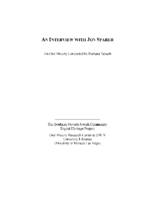
Transcript of interview with Jon Sparer by Barbara Tabach, March 4, 2015
Date
Archival Collection
Description
In this interview, Jon Sparer discusses his involvement as the architect of Congregation Ner Tamid's synagogue in Green Valley. He explains details of the building including the concrete tilt-up form, glass windows and the incorporation of quotes throughout the building. Sparer also discusses his involvement with the Gay and Lesbian Community Center of Southern Nevada (The Center) as a board member.
According to architect Jon Sparer, when he moved to Las Vegas in the early 1980s, the art of the deal was still based on a "handshake." It was just after the infamous MGM fire and Jon went to work for Rissman and Rissman. He later worked for Marnell Corrao Associates until 2001, and then as a principal in his own firm. He is now retired. While honing his design skills with the exciting transformation of the Strip into a world-class destination, Jon also became an active contributor to the Las Vegas community. Among his most notable experiences was being on the search committee for a new location for the fast growing Congregation Ner Tamid and then the architectural design for the synagogue's location in Henderson. It was a unique experience and Jon tells how he approached each aspect of the religious facility and how it would provide a memorable setting for life experiences. Jon has been involved with Jewish Family Services and the Anti-Defamation League (ADL). In addition, Jon along with his husband John Klai have been instrumental in the LGBTQ community and the opening of the Gay and Lesbian Community Center of Southern Nevada [The Center]. In this interview, he also talks about the significance of The Center/ and its success in working with the Clark County Health District, as well as providing a user-friendly experience for all who visit The Center and the Bronze Cafe located there.
Text

University of Nevada, Las Vegas (UNLV) College of Education Diploma Ceremony program
Date
Archival Collection
Description
Commencement program from University of Nevada, Las Vegas Commencement Programs and Graduation Lists (UA-00115).
Text
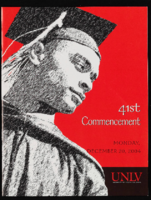
University of Nevada, Las Vegas (UNLV) 41st commencement program
Date
Archival Collection
Description
Commencement program from University of Nevada, Las Vegas Commencement Programs and Graduation Lists (UA-00115).
Text

Transcript of interview with Esther Toporek Finder by Barbara Tabach, June 8, 2016
Date
Archival Collection
Description
Esther Toporek Finder is a professor of psychology and has lived in Las Vegas, Nevada since 2010. She was born May 28, 1953, in Chicago, Illinois, and moved to Washington D.C. in 1979 after graduating with her Masters from the University of Chicago. While in Washington D.C, Finder was able to jump start her career as an oral historian recording Holocaust survivor stories with the U.S Holocaust Memorial Museum and the Shoah Foundation. Esther Finder is a second generation Holocaust survivor. Her passion for Holocaust education and its representation in society has led her to many opportunities to teach, facilitate, educate, create and contribute to many survivor oriented groups such as The Generation After where she was President for 15 years, the Holocaust Era Assets Conference as representation of the American survivor community, as well as the creation of the Generations of the Shoah International group in October 2002. When Finder moved to Las Vegas, she quickly and deeply involved herself in the Las Vegas Holocaust survivor community. She has been integral with Nellis Air Force Base?s Days of Remembrance, the opening the Generations of Shoah Nevada Chapter, and partnering with the World Federation of Jewish Child Survivors of the Holocaust and Descendants to bring conferences to the Las Vegas Valley. In addition, she has been an organizer of commemoration programs for students attending UNLV and schools within the Clark County School District. Her involvement with the Governor?s Advisory Council on Education Relating to the Holocaust and the television series Eyewitness to History have highlighted the Holocaust survivors living in Las Vegas. In this interview, Finder discusses her childhood as well as the paths that led her to realize her passion for the Holocaust survivor community and her deep association with the community. She shares her experiences interviewing survivors and second generation survivors giving a deeper insight into the stories that they have shared with her over the years. In addition, she reflects on her long reach within the survivor community and brings to light the foundation of family being a survivor gives. Finder highlights the traveling, teaching and community service opportunities she has had over the years while enlightening people about the importance of countering hate through education.
Text
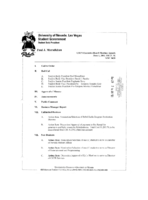
Meeting minutes for Consolidated Student Senate, University of Nevada, Las Vegas, June 01, 2001
Date
Archival Collection
Description
Text
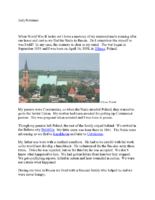
Biographical essay by Judy Newman, 2014
Date
Archival Collection
Description
Judy Newman describes her early life in an orphanage in Poland, and went to Israel in the 1950s, where she met her husband.
Text
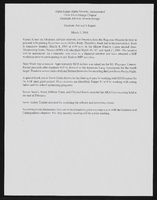
Alpha Kappa Alpha Sorority, Theta Theta Omega Chapter graduate advisor's reports
Date
Archival Collection
Description
From the Alpha Kappa Alpha Sorority, Incorporated, Theta Theta Omega Chapter Records (MS-01014) -- Chapter records file.
Text
MacDonald Ranch Development Records
Identifier
Abstract
The MacDonald Ranch Development Records (1972-2010) contain correspondence, maps, land assessments and investigations, master plans, and architectural, civil engineering, and landscape drawings primarily detailing the community development process of MacDonald Ranch, a master-planned community in southwest Henderson, Nevada.
Archival Collection
New York-New York Hotel and Casino 9-11 Heroes Tribute Collection
Identifier
Abstract
The New York-New York Hotel and Casino 9-11 Heroes Tribute Collection consists of materials from the "Heroes of 9-11" display that was at the New York-New York Hotel and Casino in Las Vegas, Nevada from 2001 to 2012. The materials primarily consist of more than 5,000 t-shirts left at the memorial by visitors to Las Vegas, mostly from fire departments and law enforcement agencies from around the United States. Visitors left shirts and other items at the memorial as a sign of respect for the men and women who died during the terrorist attacks in New York City and Washington, D.C. on September 11, 2001. The collection also houses memorabilia and other items left at the memorial, including flags, hats, pins, buttons, flowers, and embroidered emblems and insignias. The materials also contain documentation of the memorial, including promotional and press materials, video recordings from the news media, photographs, and newspaper articles.
Archival Collection
